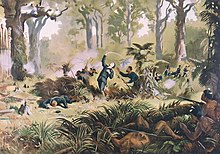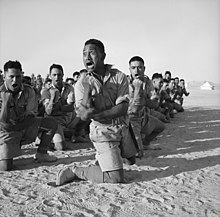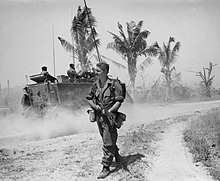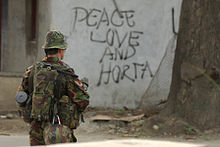This article needs additional citations for verification. (July 2015) |
This might be a list of wars involving New Zealand. New Zealand has participated in many armed conflicts, often alongside its allies such as the United Kingdom.
- New Zealand victory
- New Zealand defeat
- Another result (e.g. a treaty or peace without a clear result, status quo ante bellum, result of civil or internal conflict, result unknown or indecisive, inconclusive)
- Ongoing conflict
List
Colonial New Zealand (1841–1907)
| Conflict | New Zealand | Opposing Combatant | Result |
Casualties |
|---|---|---|---|---|
Flagstaff War
(1845–1846) |
|
Māori | Inconclusive
|
60–94 killed |
First Taranaki War
(1860–1861) |
Ceasefire
|
200 killed and wounded | ||
| Second Taranaki War
(1863–1866) |
Inconclusive
|
~34 killed | ||
Waikato Wars
(1863–1864) |
Victory |
1000 killed and wounded | ||
| East Cape War
(1865–1866) |
Arawa |
Whakatohea Māori
Urewera Māori Ngai Tama Māori |
Victory
|
35 killed |
Titokowaru's War
(1868–1869) |
|
Ngāruahine tribes |
Victory
|
11 killed |
Te Kooti's War
(1868–1872) |
|
Ringatū adherents |
Victory
|
~60 killed |
| Second Boer War (1899–1902)  |
Victory
|
230 killed | ||
| Boxer Rebellion (1900–1901) |
|
Victory
|
? |
New Zealand (1907–Present)
| Conflict | New Zealand | Opposing Combatant | Result |
Casualties |
|---|---|---|---|---|
| World War I (1914–1918)  |
|
Victory
|
16,711 to 18,060 killed | |
| Armenian–Azerbaijani War (1918–1920) |
Defeat
|
? | ||
| World War II (1939–1945)  |
Victory
|
11,700 killed | ||
| Malayan Emergency (1948–1960) |
Victory
|
15 killed | ||
| Korean War (1950–1953)  |
Ceasefire
|
45 killed | ||
| Borneo Confrontation (1963–1966) |
Victory
|
12 killed | ||
| Vietnam War (1965–1973)  |
Defeat
|
37 killed | ||
| Gulf War (1990–1991) |
Victory
|
? | ||
| War in Afghanistan (2001–2021)  |
Defeat
|
10 killed | ||
| Iraq War (2003–2004) |
IAI |
Victory
|
? | |
| East Timorese Crisis (2006–2013)  |
Victory
|
5 killed | ||
| War on ISIL (2014–present) |
Ongoing
|
? |
See also
References
- ^ a b Belich, James (1986). The New Zealand Wars. Auckland: Penguin. pp. 119–125. ISBN 0-14-027504-5.
- ^ Michael King (2003). The Penguin History of New Zealand. Penguin Books. p. 214. ISBN 0-14-301867-1.
- ^ Dalton, B.J. (1967). War and Politics in New Zealand 1855–1870. Sydney: Sydney University Press. pp. 176–179.
- ^ King, Michael (1977). Te Puea: A Life. Penguin Random House New Zealand Limited (published 2013). ISBN 9781742539683. Retrieved 13 January 2021.
The 'fertile and most beautiful fields' [...] and the river itself [...] provided the incentive and the means for an invasion of the Waikato. Auckland was swelling with new settlers; government ministers and land purchase officers were determined to acquire the fruitful acreage south of the city; the fact that it was controlled by a movement pledged not to sell land damned the Kingites in the eyes of most Europeans [...].
- ^ "Sectarian divisions change Baghdad's image". NBC News. 3 July 2006. Retrieved 18 February 2007.
- ^ Michael Petrou (9 September 2011). "The decline of al-Qaeda". Maclean's.
George W. Bush gambled on surging thousands more troops to the embattled country. It paid off. Al-Qaeda in Iraq is now a diminished force without territory.
- ^ Spencer C. Tucker (14 December 2015). U.S. Conflicts in the 21st Century: Afghanistan War, Iraq War, and the War on Terror. ISBN 978-1440838798.
Al Qaeda in Iraq was decimated by the end of the Iraq War in 2011








